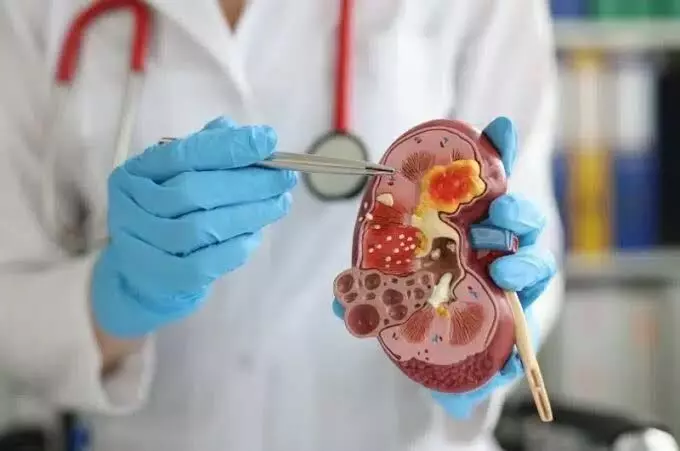Don’t ignore the signs: Doctors warn of common kidney cancer symptoms
Weakness, weight loss could be more than just stress, warn doctors of common kidney cancer symptoms
By Newsmeter Network
Spotting the signs early of kidney cancer could improve survival, say doctors on World Kidney Cancer Day
Hyderabad: Kidney cancer or renal cell carcinoma (RCC) is one of the growing health cancers across the globe, with about 3 per cent of all cancer cases. As per the 2022 report of Globocan, the data from the World Cancer Research Fund showed that out of 4.34 lakh kidney cancer cases globally, 20,000 cases are from India.
India also accounts for nearly 10,000 annual deaths due to kidney cancer, with a high incidence rate of 2 per 1 lakh males and 1 per 1 lakh females.
One of the major concerns in India is the late detection of kidney cancer, which is in an advanced stage, posing a major challenge to treatment outcome and survival.
How does kidney cancer develop?
On every third Thursday of the year, World Kidney Cancer Day is observed to create awareness about the condition, the importance of early detection and the need for quick treatment.
Dr Nishith Vaddeboina, a senior consultant oncologist at Renova Century Hospitals, explained about how kidney cancer develops: “Kidney cancer starts in the tiny tubes in the kidney called the proximal convoluted tubular cells, which filter waste from the blood. It usually starts in a single kidney, although it can sometimes affect both,” he said.
Types of kidney cancer
There are several types of kidney cancer of RCC, but the most common type is the Clear Cell Renal Cell Carcinoma (ccRCC).
“This type accounts for 80 per cent of cases, while Papillary Renal Cell Carcinoma makes up 10-15 per cent of cases, and Chromophobe Renal Cell Carcinoma is about 5 per cent. Other rare types, like sarcoma, Wilms tumour, account for the rest,” Dr Nishith said.
Common symptoms and risk factors
There are certain symptoms which include blood in urine (hematuria), flank or lower back pain, a palpable lump in the abdominal area, unintentional weight loss, weakness, persistent fatigue and unexplained fever.
Dr Nishith said, “The risk factors that raise the chances of kidney cancer are age, since people above 50 are at a higher risk. Smoking doubles the risk of developing kidney cancer, while obesity and diabetes can contribute,” Dr Nishith added.
Hypertension (high blood pressure), family history of kidney cancer, and prolonged exposure to hazardous chemicals or asbestos can also lead to kidney cancer.
Diagnosis and treatment
Experts advise people to exercise caution when symptoms are felt to ensure early diagnosis and adequate treatment.
“Ultrasound and contrast-enhanced CT scan are the first imaging tests that spot abnormalities. A biopsy is done to confirm the cancer. Here, a small piece of the tumour is taken and sent for microscopic examination. Other imaging tests, like MRI or PET-CT, are done to know the extent and stage of the cancer,” Dr Nishith said.
Removal of the kidney, either partial or complete, through surgery, is the most common treatment.
“Surgery is the main treatment for tumours confined to only the kidneys. Immunotherapy or targeted therapy is used in operable or Stage 4 cancers and is currently the standard of care,” Dr Nishith added.
Radiotherapy, sometimes used for symptom relief or when surgery isn’t possible. Chemotherapy has a very limited role and is often not advised for treating kidney cancers.
Survival and prevention
Dr Nishith, while insisting on the early diagnosis with the onset of common symptoms, said, “If kidney cancer is found at an early stage, the 5-year survival rate is above 90 per cent. But if it has already spread to other parts of the body, this drops to about 13 per cent.”
The simple prevention strategies to avoid kidney cancer include quitting smoking, maintaining a healthy weight, keeping diabetes and blood pressure under control, getting regular health check-ups, and most importantly, not ignoring any suspicious symptoms.